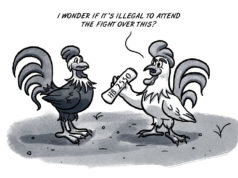Within the first 30 seconds of Tiger King, the word “crazy” is used three times. And that’s perhaps the most obvious thing to say about the new Netflix series — that it’s “crazy.” It’s certainly being pitched that way, with a subtitle that promises “Murder, Mayhem and Madness.”
The show, which spent time this week as the most popular thing streaming on Netflix, centers on Joe Exotic, who ran a zoo in Wynnewood, Oklahoma, for many years before being sent to prison on charges of taking out a hit on an animal-rights activist named Carole Baskin.
Joe Exotic has been a famous local eccentric for years, known at the very least for his billboards along I-35 and for his flamboyant presidential and gubernatorial campaigns in 2016 and 2018. You can describe him — bleach-blonde mullet, piercings, sparkly shirts and leather vests, guns and explosives in abundance, two much younger husbands (at the same time) — but it’s hard to capture the erratic energy that he gives off on camera, or the way he ruled over his tiger park like a personal fiefdom, or the brief moments when he is surprisingly disarming.
Any Oklahomans concerned that Joe Exotic’s new megafame is going to ruin the state’s reputation shouldn’t worry too much; it quickly becomes apparent that he and the other big-cat enthusiasts featured in the series live in a world of their own. There’s the wild-eyed Dr. Bhagavan Antle, who adopted his first name after studying in Yogaville, Virginia, and whose doctorate is in “mystical science.” There’s Mario Tabraue, a former drug kingpin who claims to be the inspiration for Scarface. There’s Jeff Lowe, a Vegas-based swinger and felon whose grandfather owned a circus.
And then there’s Carole Baskin, who has moony blue eyes and long hippy hair and wears only animal prints, often with flower crowns. She has dedicated her life to stopping the private ownership and breeding of big cats. (“I really believe in life that you can only be good at one thing,” she says. “So I don’t read the newspaper, I don’t watch the news on television, unless there’s a cat involved.”) Joe Exotic, as one of the most active breeders in the U.S., is a main targets of her campaigns.
Joe and Carole clearly despise each other — Joe bombastically and violently, Carole archly and self-righteously — and their rivalry, which Joe initially describes as “a pissing mach,” gradually escalates into threats and lawsuits and finally the contract killing (which was never carried out).
Just another day with the tiger people
It’s somewhat a matter of luck that the directors of Tiger King, Eric Goode and Rebecca Chaiklin, captured this saga. They initially set out to make a broader documentary about the private ownership of exotic cats (shockingly, there are more privately owned tigers in the United States than there are in the wild worldwide), but that story was quickly overshadowed by the outsized personalities and drama they found among the tiger-lovers, and they ended up following Joe for five years.
Everywhere you turn in these episodes, something unbelievable is happening. Mysterious fires are breaking out and killing alligators that once belonged to Michael Jackson. Doc Antle is forcing one of his several wives to get breast implants. Joe’s employees are surviving off expired meat sent to the zoo by Walmart to feed the tigers. An intern at Carole’s sanctuary is cheerfully explaining that she works 12-hour days, six days a week, for free. A worker at Joe’s is returning to the job a week after having her hand bitten off. Carole is being accused (fairly convincingly) of murdering her ex-husband and feeding him to her cats. Joe is making a music video about this alleged murder. (Baskin recently published a long blog post disputing Tiger King’s portrayal of her husband’s disappearance.)
By the time the murder-for-hire plot rolls around in the series, it seems almost ho-hum — just another day with the tiger people.
And this is the predominant effect of Tiger King: It’s an unrelenting bombardment of one preposterous, outrageous or shocking thing after another. After each episode, you’ll be sending your friends incredulous “Did you see that??” texts, but, in the end, it’s hard to know what exactly it is you did see, or what to make of it.
The problem is that there’s no stable center here, no reliable narrator to serve as an anchor line to pull you through. Did Carole kill her husband? Did Jeff Lowe engineer Joe’s imprisonment in order to steal his zoo? Maybe? Probably? It’s hard to say. Nobody in the documentary seems entirely trustworthy, and they all exist in a web of rivalries and alliances that can shift on a dime as each of them pursues his or her own interests. Everyone’s both a victim and a villain. When Joe gets sent to prison, it doesn’t feel like a cathartic comeuppance or like a travesty of justice; it just feels sort of sad and meaningless.
A deep seam of trauma
Tiger King is framed as a true-crime story, but it has the aftertaste of a tragedy. Underneath all the outrageousness and eccentricity is a deep seam of trauma, and particularly sexual trauma and abuse. Carole, we learn, left home at 15 after her family blamed her for being raped. Joe says that when he came out to his parents, his father responded by making Joe promise not to come to his funeral. (Robert Moor, a journalist who spent four years reporting on Joe, noted on Twitter recently that Joe was also a victim of sexual abuse as a child.) Doc Antle selects young virgins from among his interns to become his wives. Jeff Lowe, sitting next to his pregnant wife, tells the camera that he’s excited about becoming a father only because of the nanny. Joe’s husbands are very young, addicted to meth, and apparently not even gay. Scratch the surface of the “craziness” and what you find is both real mental illness and a lot of brokenness.
And the poor tigers somehow get wrapped up in all this. One extraordinary thing to witness in Tiger King is how hypnotizing these creatures can be. Apparently people will pay any amount of money, do any amount of unpaid labor, sleep with just about anyone to have some connection with lions and tigers and other exotic animals. And the owners make no secret of the fact that they derive a sense of identity and power from dominating and having a personal intimacy with the cats. It’s as though they believe they have absorbed some of the animals’ allure and beauty and prowess and danger.
All of us have our defenses and our ways of compensating for our insecurities, but the impulse to protect yourself from the world by linking yourself to an animal that might kill you must speak to an extraordinary need.
Tiger King hints at several questions — having to do with the ways in which trauma multiplies itself and the strangeness of our relationships with animals, among other things — that, if they were more fully explored, could lead to rich and valuable insights. But the series never quite gets there. Not only are the murder, mayhem and madness much more entertaining (and they are extremely entertaining), they also make for an almost impenetrable distraction from the real human vulnerabilities that drive them.
RELATED
Joe Exotic says he was booted from Trump fundraiser despite paying $1,000





















